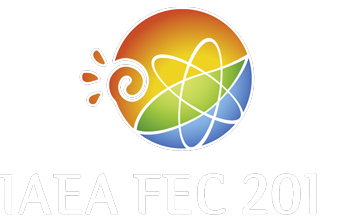Speaker
Hans Rinderknecht
(Lawrence Livermore National Laboratory)
Description
Implosions of thin-shell capsules produce strongly-shocked (M > 10), low-density (ρ ~ 1 mg/cc), high-temperature (Ti ~ keV) plasmas, comparable to those produced in the strongly-shocked DT-vapor in inertial confinement fusion (ICF) experiments. A series of thin-glass targets was filled with mixtures of deuterium and Helium-3 gas ranging from 20% to 100% deuterium and imploded on the OMEGA laser at the Laboratory for Laser Energetics to investigate the impact of multi-species ion kinetic mechanisms on ICF-relevant plasmas. Anomalous trends in nuclear yields and burn-averaged ion temperatures, which have been interpreted as signatures of ion species separation and ion thermal decoupling [H. G. Rinderknecht et al., Phys. Rev. Lett. 114, 025001 (2015)], are found not to be consistent with single-species ion kinetic effects alone. Experimentally-inferred Knudsen numbers predict an opposite yield and temperature trend to those observed, confirming the dominance of multi-species physics in these experiments. Ion density is inferred to be half of the predicted value: models of undercompression and loss of ions at the fuel/ablator interface are considered. The impact of the observed kinetic physics mechanisms on the formation of the hotspot in ICF experiments is discussed.
| Country or International Organization | United States of America |
|---|---|
| Paper Number | IFE/1-5 |
Author
Hans Rinderknecht
(Lawrence Livermore National Laboratory)
Co-authors
Dr
Alex Zylstra
(Los Alamos National Laboratory)
Dr
Chikang Li
(MIT)
Dr
Christian Stoeckl
(Laboratory for Laser Energetics)
Dr
Craig Sangster
(Laboratory for Laser Energetics)
Dr
Fredrick Seguin
(Massachusetts Institute of Technology)
Dr
Grisha Kagan
(Los Alamos National Laboratory)
Mr
Hong Sio
(Massachusetts Institute of Technology)
Dr
Johan Frenje
(Massachusetts Institute of Technology)
Dr
Maria Gatu Johnson
(Massachusetts Institute of Technology)
Dr
Michael Rosenberg
(Laboratory for Laser Energetics)
Dr
Nelson Hoffman
(Los Alamos National Laboratory)
Dr
Olivier Larroche
(Commissariat a l'Energie Atomique)
Dr
Peter Amendt
(Lawrence Livermore National Laboratory)
Dr
Richard Petrasso
(Massachusetts Institute of Technology)
Dr
Scott Wilks
(Lawrence Livermore National Laboratory)
Dr
Vladimir Glebov
(Laboratory for Laser Energetics)

